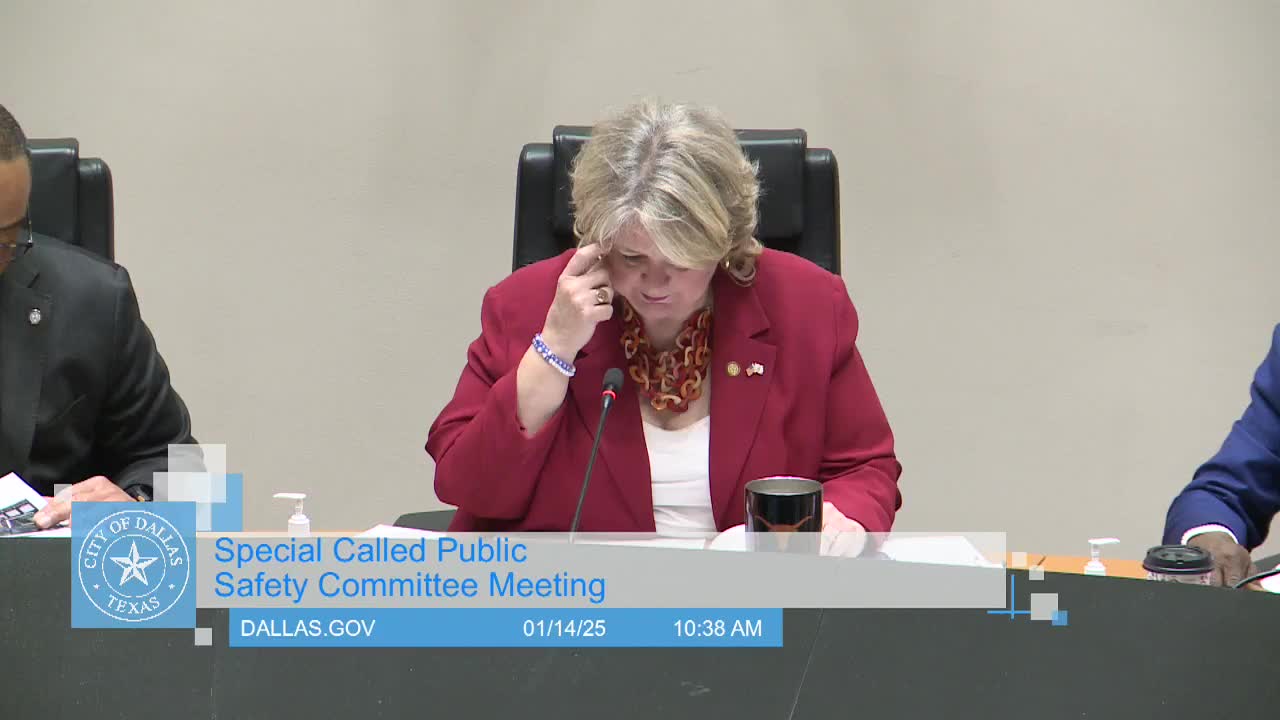City updates RightCare, Medic‑1 and blood‑transfusion pilot as part of public‑safety portfolio
Get AI-powered insights, summaries, and transcripts
Subscribe
Summary
Officials briefed the Public Safety Committee on behavioral‑health response teams (RightCare), Medic‑1 pilot paramedic teams, ambulance fleet maintenance and a planned blood transfusion pilot to support prehospital hemorrhage care.
City emergency‑response leaders provided several briefings to the Public Safety Committee on Jan. 14 covering behavioral‑health co‑response teams (RightCare), Medic‑1 mobile paramedic units, DFR fleet maintenance and a planned prehospital blood pilot.
RightCare and co‑response teams: City staff reported RightCare is operating 18 teams 24 hours a day and is responding to roughly 55–60% of eligible calls for which a RightCare response is appropriate. RightCare teams include police, fire and a Parkland social‑work component and also deploy two evening roving teams to supplement patrol‑assigned teams. Council members asked whether funding is sufficient; staff said current funding supports 18 teams and budget reviews occur annually.
Medic‑1: Dallas Fire Rescue said Medic‑1 and Medic‑2 pilot units are intended to reduce calls handled by engines and ambulances in the central business district by deploying a paramedic and a crisis‑intervention team member in a nimble vehicle for low‑acuity calls, welfare checks and behavioral‑health responses. The program is currently limited‑hour coverage and the department is tracking call volume and transport outcomes.
DFR fleet maintenance: The fire department briefed the committee that a subset of ambulances are in repair or under warranty at vendors; some wrecked vehicles and other apparatus are being used for parts or are awaiting repair. The department reported nine ambulances are on order to help reach target operational capacity.
Prehospital blood pilot: The city’s Office of the Medical Director and Dallas Fire Rescue described a pilot to carry blood on selected SDO (Special Duty Officer) cars to support life‑threatening hemorrhage cases. Interim Chief Justin Ball said the pilot will begin with two SDO vehicles based at Station 42 (Love Field area) and Station 32 (Pleasant Grove) and will cover citywide responses while the pilot is evaluated. Medical leaders said the American Red Cross will supply component blood for the pilot while the city demonstrates regulatory compliance; the department intends to pursue whole‑blood use after pilot validation and regulatory review.
Committee questions and follow‑up: Council members asked for dispatch and outcome data tied to Medic‑1 and RightCare (including impacts on ambulance transports and apparatus utilization) and for a schedule to expand the blood pilot if initial results are favorable. Officials said Medic‑1 documentation is tracked in the electronic patient care records system and CAD, and that additional operational data can be provided at future briefings.
Ending: Committee members asked staff to return with follow‑up performance measures, dispatch and transport outcomes and cost information related to fleet repairs and potential program expansions.
